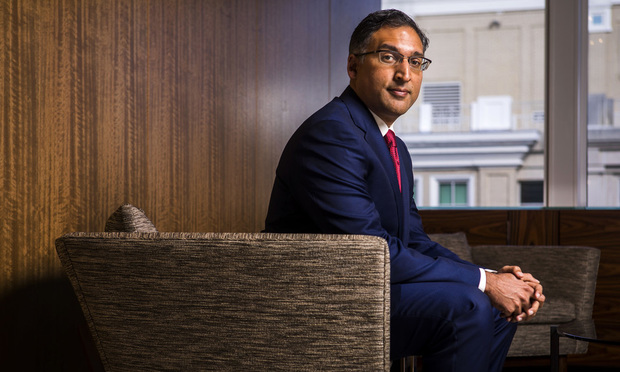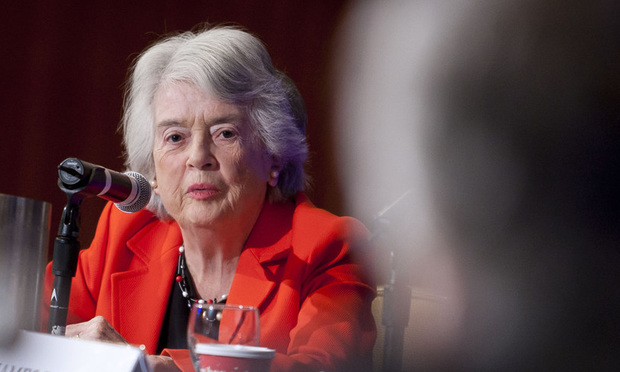Justices Pick 8 Cases, But Put Off Blockbusters
As of Friday, the court has 19 unscheduled arguments on its docket. And if the justices keep their recent pattern of only two cases per day per two-week argument session, that leaves room for three more grants to fill the final April calendar—the final argument cycle of the term.
But, of course, the justices can do whatever they choose to do. They could schedule afternoon arguments, or could expedite briefing for late-granted cases. Whether this coming Friday's conference is the informal cutoff for grants to be heard this term only time will tell.
Here is a quick look at
the latest grants and the lawyers who filed and opposed the petitions, and who may end up arguing the cases. The court granted two cases brought by former acting solicitor general
Neal Katyal (above).
Also on the roster is
Raffi Melkonian, a pillar of the #AppellateTwitter movement, and Wisconsin solicitor general
Misha Tseytlin, who is unlikely to argue. His
position was abolished as part of the state's partisan squabbling last fall, and his name no longer appears in the state's
Justice Department website. Tseytlin was counsel of record on the state's December 5 brief in opposition, but
Daniel Lennington, a senior counsel in the Wisconsin Department of Justice, is now listed as counsel of record on the court's docket.
>> Quarles v. United States
Does generic burglary in the Armed Career Criminal Act require "an intent-at-entry" element or is it enough that intent to commit a crime was formed while "remaining in" the building? For petitioner:
Jeremy Marwell,
Vinson & Elkins, Washington, D.C. For respondent: U.S. Solicitor General
Noel Francisco.
>> Rehaif v. United States
When prosecuting an undocumented alien for possession of a firearm and ammunition, must the government prove that the defendant not only knowingly possessed a firearm but also knew he was unlawfully in the United States? For petitioner: Assistant Federal Defender
Robert Godfrey of Orlando, Florida. For respondent: U.S. Solicitor General
Noel Francisco.
>> Parker Drilling Management Services v. Newton
Do California wage-and-hour laws apply to claims by workers on drilling platforms on the outer continental shelf even though the federal Fair Labor Standards Act provides a comprehensive set of federal rights and remedies? For petitioner:
Paul Clement, Kirkland & Ellis, Washington, D.C. For respondent:
Michael Strauss, Strauss & Strauss, Ventura, California.
>> North Carolina Dept. of Revenue v. Kaestner Family Trust
Does the due process clause prohibit states from taxing trusts based on trust beneficiaries' in-state residency? For petitioner: North Carolina Solicitor General
Matthew Sawchak. For respondent:
Thomas Myrick,
Moore & Van Allen, Charlotte, North Carolina.
>> Food Marketing Institute v. Argus Leader Media
A rare Freedom of Information Act case that could end circuit splits over the meaning of the statute's Exemption 4, which protects from disclosure all "confidential" private-sector "commercial or financial information" within the government's possession. The case has drawn considerable amicus support at the cert stage, including a Chamber of Commerce brief filed by
John Elwood of
Vinson & Elkins, and
Adam Unikowsky of
Jenner & Block for the Retail Litigation Center. For plaintiff:
Gavin Villareal, Baker Botts, Austin, Texas. For respondent:
Robert Loeb of
Orrick Herrington & Sutcliffe, Washington, D.C.
>> McDonough v. Smith
In the case of Edward McDonough, a former election official from New York, the case may resolve when the statute of limitations begins to run for a Section 1983 civil rights claim based on fabrication of evidence in criminal proceedings. For plaintiff:
Neal Katyal, Hogan Lovells, Washington, D.C. For respondent:
Thomas O'Connor, Napierski, VanDenburgh, Napierski & O'Connor, Albany, New York.
>> Fort Bend County, Texas v. Davis
Whether the requirement in Title VII of the Civil Rights Act for employment discrimination claimants to first exhaust claims with the EEOC is a jurisdictional prerequisite or a waivable claim-processing rule. For plaintiff:
Neal Katyal of
Hogan Lovells. For respondent:
Raffi Melkonian of
Wright Close & Barger, Houston, Texas.
>> Mitchell v. Wisconsin
A test of the constitutionality of a Wisconsin law allowing law-enforcement officials to draw blood from unconscious drivers without a warrant. For plaintiff:
Thomas Aquino, office of Wisconsin public defender, Madison, Wisconsin. For respondent:
Daniel Lennington of the Wisconsin Department of Justice.













